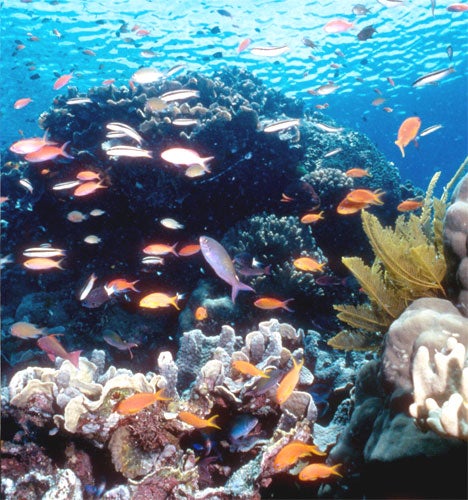Great Barrier Reef could take 20 years to recover from grounding

A coal carrier, which ran aground and leaked oil on the Great Barrier Reef, cut a two-mile-long scar into the shoal and may have smeared paint which will prevent marine life from growing back,
it was revealed yesterday.
Even if severe toxic contamination is not found at the site, initial assessments by the Great Barrier Reef Marine Park Authority indicate it could take 20 years for the world's largest coral reef to recover.
The marine park authority's chief scientist, David Wachenfeld, said: "There is more damage to this reef than I have ever seen in any previous Great Barrier Reef groundings." In some areas, "all marine life has been completely flattened and the structure of the shoal has been pulverised by the weight of the vessel," Mr Wachenfeld added.
The Chinese coal ship, the Shen Neng 1, veered into protected waters and slammed into a shoal on 3 April. Coral shredded part of its hull, causing a leak of about three tonnes of fuel oil, which was later dispersed by chemical sprays and is believed to have caused little or no damage to the reef. Small amounts of oil, however, have begun washing up on beaches near where the ship ran aground, according to Maritime Safety Queensland.
Australian authorities are investigating alleged breaches of the law connected with the accident. The Prime Minister, Kevin Rudd, has warned that cargo ships entering restricted waters would face the full force of the law.
The reef was hit particularly badly because the vessel did not stay in one place once it grounded. Instead, tides and currents pushed it along the reef, crushing and smearing potentially toxic paint on to coral and plants, he said.
Shen Neng 1 has now been lifted off the reef after crews spent three days pumping fuel from the ship to lighten it.
The Great Barrier Reef is a World Heritage site because of its gleaming waters and environmental value as home to thousands of marine species.
Subscribe to Independent Premium to bookmark this article
Want to bookmark your favourite articles and stories to read or reference later? Start your Independent Premium subscription today.

Join our commenting forum
Join thought-provoking conversations, follow other Independent readers and see their replies